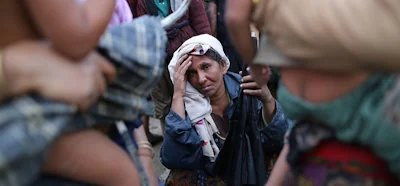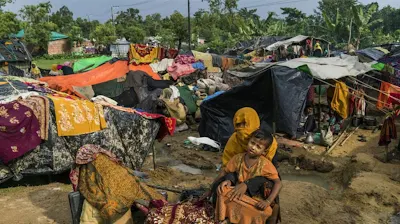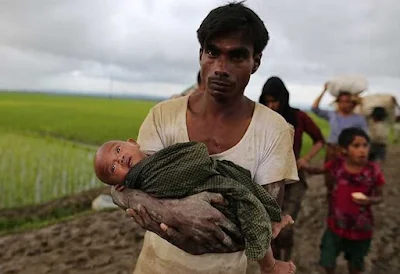Nobel Prize Winner, Aung San Suu Kyi, presiding over the Rohingya Genocide
https://karama.huquq.com/2017/09/nobel-prize-winner-aung-san-suu-kyi.html
Desmond Tutu condemns Aung San Suu Kyi: 'Silence is too high a price'
Nobel laureate issues heartfelt letter to fellow peace prize winner calling for her to speak up for Rohingya in Myanmar
Nobel laureate issues heartfelt letter to fellow peace prize winner calling for her to speak up for Rohingya in Myanmar
The Nobel laureate Desmond Tutu has called on Aung San Suu Kyi to end military-led operations against Myanmar’s Rohingya minority that have driven 270,000 refugees from the country in the past fortnight.
The 85-year old archbishop said the “unfolding horror” and “ethnic cleansing” in the country’s Rahkine region had forced him to speak out against the woman he admired and considered “a dearly beloved sister”.
...
On Tuesday, the United Nations secretary general, Antonio Guterres, said the government clearance operations in Rakhine “risked” ethnic cleansing. A Change.org petition to revoke Aung San Suu Kyi’s Nobel peace prize had reached 377,332 signatures by Friday. source
...
...
On Tuesday, the United Nations secretary general, Antonio Guterres, said the government clearance operations in Rakhine “risked” ethnic cleansing. A Change.org petition to revoke Aung San Suu Kyi’s Nobel peace prize had reached 377,332 signatures by Friday. source
...
Myanmar's security forces have been attacking the Rohingya Muslims and torching their villages since October 2016 in a bid to push them out of the western state of Rakhine.
The attacks have intensified since August 25, following alleged armed attacks on police and military posts in Rakhine.
Prior to that, the Muslims were frequent targets of Buddhist mobs. Tens of thousands of Rohingya were driven from their homes in another wave of violence in 2012.
The UN refugee agency, UNHCR, confirmed Thursday that some 164,000 Rohingya Muslims had fled Myanmar’s Rakhine to seek refuge in camps in Bangladesh since the harsh crackdown against them.
The UNHCR spokeswoman, Vivian Tan, said the figure could go up further as thousands were still crossing the border.
...
World's largest stateless community
The Rohingya are the world's largest stateless community and one of its most persecuted minorities.
Using a dialect similar to that spoken in Chittagong in southeast Bangladesh, the Sunni Muslims are loathed by many in majority-Buddhist Myanmar who see them as illegal immigrants and call them "Bengali" - even though many have lived in Myanmar for generations.
They are not officially recognised as an ethnic group, partly due to a 1982 law stipulating that minorities must prove they lived in Myanmar prior to 1823 - before the first Anglo-Burmese war - to obtain nationality.
Most live in the impoverished western state of Rakhine but are denied citizenship and harassed by restrictions on movement and work.
More than half a million also live in Bangladeshi camps, although Dhaka only recognises a small portion as refugees.
Rohingya refugees from Myanmar's Rakhine state set up shelters at a refugee camp at Unchiprang near the Bangladeshi border town of Teknaf. (AFP Photo)
Over 250,000 refugees enter Bangladesh from Myanmar
Sectarian violence between the Rohingya and local Buddhist communities broke out in 2012, leaving more than 100 dead and the state segregated along religious lines.
Then last October things got much worse.
...
Who are the Rohingya?
Described as the world’s most persecuted people, 1.1 million Rohingya people live in Myanmar. They live predominately in Rakhine state, where they have co-existed uneasily alongside Buddhists for decades.
Rohingya people say they are descendants of Muslims, perhaps Persian and Arab traders, who came to Myanmar generations ago. Unlike the Buddhist community, they speak a language similar to the Bengali dialect of Chittagong in Bangladesh.
The Rohingya are reviled by many in Myanmar as illegal immigrants and they suffer from systematic discrimination. The Myanmar government treats them as stateless people, denying them citizenship. Stringent restrictions have been placed on Rohingya people’s freedom of movement, access to medical assistance, education and other basic services.
After centuries in Myanmar, it's estimated that half their population has fled to Bangladesh with horror stories of rapes, killings and house burnings.
...
Read also, Who are the Rohingya and why are they fleeing Myanmar?
Then last October things got much worse.
...
Who are the Rohingya?
Described as the world’s most persecuted people, 1.1 million Rohingya people live in Myanmar. They live predominately in Rakhine state, where they have co-existed uneasily alongside Buddhists for decades.
Rohingya people say they are descendants of Muslims, perhaps Persian and Arab traders, who came to Myanmar generations ago. Unlike the Buddhist community, they speak a language similar to the Bengali dialect of Chittagong in Bangladesh.
The Rohingya are reviled by many in Myanmar as illegal immigrants and they suffer from systematic discrimination. The Myanmar government treats them as stateless people, denying them citizenship. Stringent restrictions have been placed on Rohingya people’s freedom of movement, access to medical assistance, education and other basic services.
After centuries in Myanmar, it's estimated that half their population has fled to Bangladesh with horror stories of rapes, killings and house burnings.
...
Read also, Who are the Rohingya and why are they fleeing Myanmar?
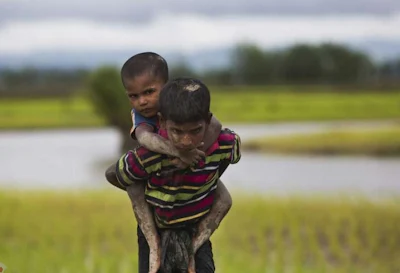 |
| Rohingya Muslims |
 |
| Rohingya Muslims |
 |
| Rohingya Muslims |
 |
| Rohingya Muslims' genocide |
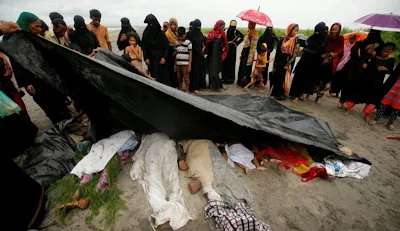 |
| Rohingya Muslims |
 |
| Rohingya Muslims |
 |
| Rohingya Muslims |
 |
| Rohingya Muslims |
 |
| Rohingya Muslims |








